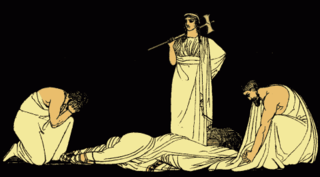Meta-ethics is the branch of ethics that seeks to understand the nature of ethical properties, statements, attitudes, and judgments. Meta-ethics is one of the three branches of ethics generally studied by philosophers, the others being normative ethics and applied ethics.
Non-cognitivism is the meta-ethical view that ethical sentences do not express propositions and thus cannot be true or false. A noncognitivist denies the cognitivist claim that "moral judgments are capable of being objectively true, because they describe some feature of the world". If moral statements cannot be true, and if one cannot know something that is not true, noncognitivism implies that moral knowledge is impossible.
In philosophical ethics, the term, naturalistic fallacy, was introduced by British philosopher G. E. Moore in his 1903 book Principia Ethica. Moore argues it would be fallacious to explain that which is good reductively, in terms of natural properties such as pleasant or desirable.
Various approaches of Value theory examine how, why, and to what degree humans value things; whether the object or subject of valuing is a person, idea, object, or anything else.
Moral relativism may be any of several philosophical positions concerned with the differences in moral judgments across different people and cultures. Descriptive moral relativism holds only that some people do in fact disagree about what is moral; meta-ethical moral relativism holds that in such disagreements, nobody is objectively right or wrong; and normative moral relativism holds that because nobody is right or wrong, we ought to tolerate the behavior of others even when we disagree about the morality of it.
Moral realism is the position that ethical sentences express propositions that refer to objective features of the world, some of which may be true to the extent that they report those features accurately. This makes moral realism a non-nihilist form of ethical cognitivism with an ontological orientation, standing in opposition to all forms of moral anti-realism and moral skepticism, including ethical subjectivism, error theory ; and non-cognitivism. Within moral realism, the two main subdivisions are ethical naturalism and ethical non-naturalism.
A land ethic is a philosophy or theoretical framework about how, ethically, humans should regard the land. The term was coined by Aldo Leopold (1887–1948) in his A Sand County Almanac (1949), a classic text of the environmental movement. There he argues that there is a critical need for a "new ethic," an "ethic dealing with human's relation to land and to the animals and plants which grow upon it".
Emotivism is a meta-ethical view that claims that ethical sentences do not express propositions but emotional attitudes. Hence, it is colloquially known as the hurrah/boo theory. Influenced by the growth of analytic philosophy and logical positivism in the 20th century, the theory was stated vividly by A. J. Ayer in his 1936 book Language, Truth and Logic, but its development owes more to C. L. Stevenson.
Descriptive ethics, also known as comparative ethics, is the study of people's beliefs about morality. It contrasts with prescriptive or normative ethics, which is the study of ethical theories that prescribe how people ought to act, and with meta-ethics, which is the study of what ethical terms and theories actually refer to. The following examples of questions that might be considered in each field illustrate the differences between the fields:
Ethics involves systematizing, defending, and recommending concepts of right and wrong behavior. A central aspect of ethics is "the good life", the life worth living or life that is simply satisfying, which is held by many philosophers to be more important than traditional moral conduct.

Charles Leslie Stevenson was an American analytic philosopher best known for his work in ethics and aesthetics.
Ethical intuitionism is a family of views in moral epistemology. At minimum, ethical intuitionism is the thesis that our intuitive awareness of value, or intuitive knowledge of evaluative facts, forms the foundation of our ethical knowledge.
Moral nihilism is the meta-ethical view that nothing is morally right or wrong.
An ethical decision is one that engenders trust, and thus indicates responsibility, fairness and caring to an individual. To be ethical, one has to demonstrate respect, and responsibility. Ethical decision-making requires a review of different options, eliminating those with an unethical standpoint, and then choosing the best ethical alternative.
Secular ethics is a branch of moral philosophy in which ethics is based solely on human faculties such as logic, empathy, reason or moral intuition, and not derived from supernatural revelation or guidance—the source of ethics in many religions. Secular ethics refers to any ethical system that does not draw on the supernatural, and includes humanism, secularism and freethinking. A classical example of literature on secular ethics is the Kural text, authored by the ancient Tamil Indian philosopher Valluvar who lived during the 1st century BCE.
An ethical bank, also known as a social, alternative, civic, or sustainable bank, is a bank concerned with the social and environmental impacts of its investments and loans. The ethical banking movement includes: ethical investment, impact investment, socially responsible investment, corporate social responsibility, and is also related to such movements as the fair trade movement, ethical consumerism, and social enterprise.
Objectivity is a philosophical concept of being true independently from individual subjectivity caused by perception, emotions, or imagination. A proposition is considered to have objective truth when its truth conditions are met without bias caused by a sentient subject. Scientific objectivity refers to the ability to judge without partiality or external influence, sometimes used synonymously with neutrality.
Ethics is the branch of philosophy that examines right and wrong moral behavior, moral concepts and moral language. Various ethical theories pose various answers to the question "What is the greatest good?" and elaborate a complete set of proper behaviors for individuals and groups. Ethical theories are closely related to forms of life in various social orders.


